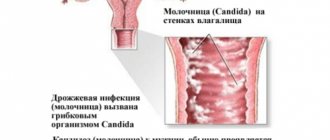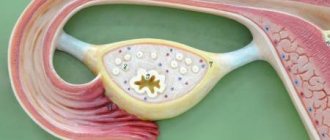Routes of transmission of candidiasis
Vaginal candidiasis is a sexually transmitted disease often diagnosed in women. Symptoms of fungal infection appear more often in the fairer sex than in men, which is due to the anatomical features of the female reproductive system.
Infection occurs in different ways:
- Candida is transmitted during unprotected sex in 45% of cases. Infection is possible not only through vaginal contact without a condom, but also through oral and anal contact. Men are more often carriers of candidiasis and do not have any special signs of the disease. Symptoms can be detected with a decrease in immunity, which often occurs with viral infections or exacerbation of chronic diseases. If the body's defenses work well, then candidiasis does not develop.
- Thrush can be passed on from the mother to the baby during childbirth. Often the disease does not manifest itself in any way before pregnancy, but during pregnancy the fungi begin to become more active, which is associated with hormonal changes in the woman’s body. A child becomes infected with candidiasis in utero, through the placenta.
- Fungal disease is also diagnosed in young children. This is possible if there is an infection on the skin and mucous membranes of the mother. Infection sometimes occurs during breastfeeding if microorganisms come into contact with a woman's nipples. In this case, symptoms often appear in the baby in the form of a cheesy coating on the mucous membranes of the mouth, but folded candidiasis is also possible.
- Household transmission of thrush is considered rare, but the possibility of infection cannot be ruled out. The source can be a washbasin, washcloth, towel, bed. It is impossible to become infected from dishes if hygiene rules are followed, since candida is not highly resistant outside the human body and quickly dies upon contact with detergents.
- Candida fungi can be transmitted through kissing. A prerequisite for infection by this method is the presence of an infection in the carrier’s oral cavity and existing damage to the mucous membranes, as well as low immunity in the second partner.
How is candidiasis transmitted?
There are several ways a fungal infection can spread between people. The main problem is the fact that the incubation period of thrush is determined only by the characteristics of the immunity of each person. You can get thrush and not even suspect it for a long time. The main methods of infection include:
- transmission to a child from mother;
- through common household items;
- transmission after unprotected sexual contact;
- during oral-genital contact or during a regular kiss.
The methods and routes of transmission of thrush are varied; it is necessary to consider each of them in more detail.
From mother to child
Infection of the child by the mother usually occurs during childbirth when passing through the birth canal. There is also a possibility of infection of a newborn in the maternity hospital if sanitary standards are neglected by the maternity ward staff. With this method of transmission, oral or intestinal candidiasis is usually diagnosed. In the child's oral cavity, characteristic signs of fungal infection are identified and appropriate treatment with antifungal drugs is prescribed.
In order not to infect the child during the process of passing through the birth canal, it is worth taking care of the treatment of thrush in advance. We invite you to consider a detailed review of suppositories for pregnant women in our separate article on the website.
Household method of transmission of infection
A large number of people also become infected through household means, for example, if among family members there is a patient with candidiasis. In this case, infection occurs through:
- shared towels;
- bed sheets;
- dishes
Some experts say that there is also a high probability of becoming infected in public places, especially in bathhouses, showers and gym locker rooms. These rooms are a breeding ground for all types of fungal infections, providing high humidity and high temperatures with poor air circulation.
Thrush can be obtained in public places
There is an opinion that spores of the Candida fungus can enter the body with food that has not been thoroughly processed. In particular, with vegetables, fruits and other products that are consumed without prior heat treatment. Candida thus enters the intestines and from there to the perineal area, and if washed incorrectly, into the vagina.
Sexual contacts
According to statistics, thrush is most often spread through sexual contact. If one partner is sick, the other is likely to be sick too. Due to the anatomical features of the female genital organs, thrush most often develops in the vagina. The infection will be transmitted from woman to man.
We must not forget that in this case the disease threatens all sexual partners of the patient. The boyfriend of a girl with candidiasis is himself a carrier of the disease. At the same time, a woman can become infected with thrush from a man who is infected by another partner. This is how the fungus is transmitted sexually along a chain.
It is also worth mentioning that sexual partners who practice oral sex are also at risk. Through oral-genital contact, a woman can infect a man, and vice versa. Thrush is so contagious that sometimes infection occurs through the usual kisses of lovers, if one of them has candidiasis in the active phase.
Is it possible to get candidiasis through a condom?
If you follow all the rules for using a condom, you cannot get a fungal infection. This method of protection against sexually transmitted diseases is considered the most reliable today.
Candida can enter the body of a healthy person if the condom is damaged or used incorrectly.
If it slips or ruptures, the risk of infection increases significantly if the partner is contagious. Violation of the integrity of the condom is possible when using creams and lubricants that are not intended for latex products. A man must be able to put on a condom correctly. The risk of its rupture increases if the expiration date has already expired or the integrity of the packaging is compromised.
Is it possible to get thrush through a towel, bed linen, hands, or a kiss?
Symptoms of thrush among men are less pronounced than in women, so they may not immediately detect this disease. If a person has a strong immune system, then the disease may not appear immediately, but after some time, until the body’s protective function weakens. Reasons for decreased immunity may include viral diseases, medications, or hypothermia.
It is necessary to treat thrush with the help of appropriate pharmacological drugs that can overcome the disease in just 5–10 days. Medicines for the treatment of thrush in both women and men are available in the form of tablets, ointments, creams, suppositories, etc. The form of use of the drug is determined by the doctor, who prescribes the prescription after undergoing an examination and making an appropriate diagnosis.
The main ways of infection with candidiasis are:
- Transmission of infection through sexual contact if a condom is not used.
- Infection with thrush can occur during oral sex, when there are fungal parasites of the genus Candida on the oral mucosa.
- Use of common items. These include: bed linen, washcloths, towels, on which fungal spores can “live” for a long time.
- You can become infected with thrush even after visiting a swimming pool, gym, sauna or bathhouse. In such cases, infection occurs when the simplest hygiene rules are not followed.
We suggest you read: How to make a man impotent - the best methods
If thrush is not treated, the disease spreads throughout the body and causes negative consequences, sometimes incompatible with life.
Candidiasis in men
What is the most common route of infection?
The most common route of infection with candidiasis is sexual. Many people of reproductive age are carriers of this infection, unaware of its presence. Lack of barrier protection during sexual intercourse leads to infection of a healthy partner. Candidiasis may not show any symptoms for many months.
Taking antibacterial drugs for another disease, indulgence in sweet and carbohydrate foods, diets, and prolonged fasting contribute to the depletion of the body and a decrease in its defenses. A consequence of weakened immune system function is the development of a fungal infection.
Through household contacts, infection is also possible, but due to the low resistance of candida in the external environment, the risk is insignificant. Infection through a kiss occurs extremely rarely, provided that the mucous membranes have damaged areas or inflammation. Fungi that enter the esophagus through the mouth can cause serious changes in the gastrointestinal tract. Without treatment, the disease leads to irreversible consequences.
Is it possible to have sex with candidiasis?
How do you get thrush? In many ways, however, in most cases, it is impossible to completely protect yourself from the fungus. But the risks of infection are greatly reduced by stopping sexual contact with an infected person. The prohibition on sexual activity is associated with the following circumstances:
- How can a woman or a man get thrush? The most likely way is sexual intercourse , and therefore it is better to abstain from it.
- Sex is associated with both men and women with the occurrence of microtraumas that can provoke an inflammatory process. This may delay the treatment of candidiasis.
- During sexual intercourse, other infections can join the Candida fungus : chlamydia, trichomonas, and so on.
- The effectiveness of antifungal therapy is reduced.
Both men and women are required to take all necessary precautions.
Is it possible to get infected again?
Re-infection with candidiasis is possible. Infection occurs in the absence of drug therapy in the sexual partner. Treatment must be carried out if one person in a couple is diagnosed with a fungal infection.
The disease is prone to relapses, and many patients mistake them for re-infection. For an absolute cure for candidiasis, it is recommended to use not only topical medications for treatment, but also oral forms of medications. Treatment of chronic infection in women is very difficult. During this period, it is important to use barrier contraceptives during sexual intercourse and avoid casual sexual intercourse. It is not recommended to kiss a partner who has signs of candidiasis in the oral cavity.
Transmission of the fungus from a candida carrier
The sexual route of infection is not the main route of candidiasis. If we evaluate the statistics, only 4 out of 10 cases of infection are associated with unprotected sexual intercourse. At the same time, the infected men had diseases or pathologies that caused a drop in the body’s resistant function:
- Chronic diseases (tuberculosis, diabetes, endocrine diseases);
- The recovery period after illness or surgery - taking strong drugs kills the body's microflora, weakening the immune system;
- Stress;
- Intensive work schedule, lack of sleep, diets, etc.
The reduced level of bactericidal protection of the male body is not able to limit the proliferation of candida, as well as other opportunistic organisms and microbes. This determines the fact that when immunity declines, all important infections and diseases appear, the development of which has hitherto been restrained by the body’s defenses.
In general, candida can be found in small quantities in any of the mucous membranes of the body, and therefore, when immunity drops, candidiasis will affect not only the genitals, oral cavity or esophagus, but also the mucous membrane of the eyes, digestive system, internal organs, etc. As for infection of a partner with sexual contact, then it is worth considering all possible cases (sex without the use of contraceptive protection):
- Oral-genital caresses - if the partner’s oral cavity is infected with a fungus, then candida spreads from the oral mucosa to the man’s penis;
- Sharing personal hygiene items - these include not only towels, washcloths, but also bed linen. In this household way, thrush can be transmitted not only to sexual partners, but also to family members, as well as to everyone around, for example, in a bathhouse or swimming pool;
- If candida gets into the water, for example, of a swimming pool, then every pool visitor has a chance of becoming infected with thrush.
Contagious fungus Candida: how is thrush transmitted?
There should be no doubt about whether thrush is contagious - yes, this disease is actively transmitted in everyday life and when communicating with strangers. What is especially important is the fact that the fungus that causes the disease can live outside the host’s body, and thus common areas also pose a risk of infection. People can infect each other with thrush without expecting it.
In what cases should you not worry?
It is very interesting whether a man can become infected when visiting public water parks or swimming pools. In general, such a method is unlikely. It is not so easy for a fungus to settle on the body of a representative of the stronger sex. For this reason, men require closer contact for infection.
In addition, water in public reservoirs is regularly disinfected with special means. They do not pose a danger to the human body, but are deadly to many pathogenic bacteria, including fungi. Of course, if employees of such places are not very conscientious about their work, the risk of contracting candidiasis increases. Such consequences are especially relevant for girls, who can then infect a man.
How contagious is thrush?
Much has been said about the fact that fungi of the genus Candida, which cause thrush, are found in the body of almost every person. This makes it difficult to understand how candidiasis can be contagious.
After all, if the microorganism already exists, why does some kind of infection occur and thrush begins? It is worth highlighting several factors that influence infection, methods for preventing which will be discussed further.
- There are several types of Candida fungus, and it is not necessary that the one “met” by the immune system will be familiar to it. It can overcome infections known to the immune system - this is what allows you not to become infected with certain diseases several times in a row. The body’s defenses and mucosal microflora cannot cope with an unknown strain of bacteria. Re-infection can also constantly occur through transmission from a partner at home or during sex.
- When the balance of the microflora of the mucous membranes is disturbed, the same infection occurs with its own fungus, because in fact its overly active reproduction and displacement of other bacteria begins.
- It has been scientifically proven that the fungus is in the body of more than 50% of healthy people who have never had thrush. This, however, does not exclude the fact that for others, any fungal infections are a 100% way of contracting thrush, which cannot be avoided.
Male thrush
Before considering the methods of transmitting thrush, let’s get acquainted with “male” thrush. Candida fungus actively multiplies on any mucous membrane without exception. Not only on the genitals, but also on the mucous membrane of the intestinal tract, in the mouth, etc.
Can a man infect a woman with thrush? It definitely can. Most often this occurs due to promiscuity. When a man often changes partners. Accordingly, he may well infect his new “lady” with thrush.
What does thrush in men look like and how to treat it? Candidiasis does not appear externally. Therefore, a man may not even know that a fungus “lives” on the mucous membranes of the genital organs for a long time. Only when the immune system is weakened candidiasis shows its first symptoms. We'll talk about this in more detail below.
“Male” thrush is practically no different from “female” thrush. Burning and itching are typical symptoms. A man may experience redness on the head of the penis and a swollen urethra. Sometimes uncharacteristic white and granular discharge from the urethra may form. In its advanced form, candidiasis manifests itself as severe pain during ejaculation or urination. White “threads” are observed.
Methods of infection
Many people believe that thrush is transmitted sexually and nothing else. This is one of the most dangerous misconceptions about this disease. It costs nothing to become infected with it through everyday life at home, at work, at school or in any public place, for example, in the gym or in a massage parlour.
Firstly, being a carrier of thrush, a person does not even suspect it, because the infection can be in “sleeping” mode until it finds itself in more favorable conditions. Thus, in a couple, a woman can infect a man without knowing it, and vice versa. Secondly, the Candida fungus is able to survive outside the human body, and therefore is quickly transmitted.
For example, a woman can become infected with candidiasis by using other people's bath products, without checking the cleanliness of public bathrooms before sitting down, and sharing lip cosmetics with someone else.
Thrush in men often begins with the accumulation of fungus on the underwear. It is especially bad that at this stage, a man is often simply a carrier of thrush, and ultimately infects his wife.
Everyone is at risk of contracting skin candidiasis, because it is literally transmitted from palm to palm. Thus, a man is more likely to become infected with thrush in this way than a woman, due to the habit of shaking hands. The fungus remains on the same cloth hand towels in restrooms, so disposable paper ones are considered a more hygienic option. Sanitation rules are largely dictated by how you can become infected with thrush, and are aimed at preventing this.
Is thrush contagious, is candidiasis contagious or not?
Sexual intercourse is far from the only way to transmit candida fungus from a carrier to an infected person. If you study official statistics, you will find out that only every fourth case of thrush infection is somehow associated with unprotected sex, and this is, in fact, quite small.
In addition, when transmitted through sexual contact, the current health status of the man is of great importance. Many people have noted the presence of various concomitant diseases, as well as other factors that directly affect the immune system:
- chronic lack of sleep, unbalanced nutrition and improper diets, increased fatigue at work;
- constant being in a stressful state;
- recovery after operations and serious illnesses. Here it is necessary to talk about taking strong medications that directly affect the human immune system;
- endocrine diseases;
- tuberculosis;
- diabetes.
People who are sexually promiscuous are also at risk.
You can become infected even through an ordinary kiss if the pathogen is present in the oral cavity. A much more dangerous option is oral-genital sex, in which partners can transfer candida from the mouth directly to the penis or from the vagina to the mouth. The situation is significantly aggravated if there are even damages invisible to the human eye on the surface of the mucous membrane of the mouth or penis, which are the entrance gates for various types of infections, not just thrush.
Sharing personal hygiene items significantly increases the risk of infection. The fact is that the fungus can live for some time on the surface of towels, washcloths, toothbrushes and other items that can be used as a single copy by both partners. This also applies to bed linen.
It is worth noting that in this case, infection can affect all family members, not only people who have intimate or sexual relationships.
The traditional breeding ground for various infections, including candida fungus, are public baths, saunas or swimming pools, that is, places where people stay without protective clothing. You need to understand that the risk of infection here directly depends on how well the cleanliness of artificial reservoirs is taken care of.
If they are regularly treated with chlorine, then it will be virtually impossible to get thrush, except perhaps nail candidiasis, but it is much easier to cure. But if chemical water purification is carried out extremely rarely or not at all, you should refuse to visit such a place.
Is thrush contagious for men who avoid unprotected and spontaneous sexual intercourse? Yes, but to a much lesser extent, since it will be more difficult for the pathogenic fungus to get to a place convenient for its development.
In fact, unprotected sexual intercourse with a woman who is a carrier of the candidiasis fungus is almost guaranteed to lead to its transmission to a healthy person. But this does not mean that in all cases the migration of the pathogen will automatically lead to the development of the disease. Here, a lot depends on what kind of immune system a man has, as well as what kind of lifestyle he leads.
The pathogenic fungus is traditionally localized in the area of the external genitalia due to the fact that there is an optimal environment for its further development and reproduction. Humidity, dampness, high temperature - all this contributes to the survival of the infection. There are also a lot of skin folds here. The fact that candidiasis is more typical for girls is due to the fact that high-quality intimate hygiene, especially after sexual intercourse, without the use of special means, is essentially impossible, precisely because of the structural features of the labia, vagina and other external genitalia.
Another thing is the stronger sex. His genitals are built according to a completely different principle. Therefore, thrush is transmitted to a man much less often. The fact is that it will be extremely difficult for a single-celled fungus to “fix” itself on the mucous membrane of the head of the penis - they can be easily washed off from there. Trying to hold on, the pathogen accumulates under the foreskin, beginning to actively multiply there.
https://www.youtube.com/watch?v=x68IInRN8y0
Therefore, to avoid further infection, it is extremely important to maintain intimate hygiene, in particular immediately after sexual intercourse. It is strongly recommended that you thoroughly wash the glans and the area under the foreskin (if present), as well as empty your bladder. The latter procedure will get rid of candidiasis that has entered the urethra.
Thrush occurs 10 times more often in women than in men. This feature is explained by the anatomical structure of the genital organs, the hormonal background of a woman and its fluctuations during different periods of life: pregnancy, menstruation, menopause, etc.
A woman infected with thrush
- itching, burning, which intensifies in the afternoon and at night, after water procedures and sexual intercourse, after long walking, as well as during menstruation;
- discharge from the genital tract is abundant or moderate, reminiscent of cottage cheese;
- the vagina and vulva are swollen, red with vesicular rashes, after the opening of the vesicles erosions form;
- if thrush is chronic, the discharge becomes less abundant. The skin of the external genitalia undergoes atrophy and thickening;
- sexual intercourse causes pain and discomfort;
- Over time, the infection spreads to the urethra and bladder. In this case, pain and burning appear when urinating, as well as pain in the lower abdomen.
According to stubborn statistics, about 10% of men suffered from this disease.
The early stage is asymptomatic and hidden. The following types of thrush occur in the male genital area:
- candidal cystitis - inflammation of the bladder;
- candidal urethritis - a fungal infection that affects the urethra;
- balanitis is a condition in which a fungus affects the head of the male penis;
- postitis is a disease that affects the foreskin;
- balanoposthitis is a condition in which the head of the genital organ and the foreskin are affected simultaneously;
- mycosis of the skin - a fungal infection that affects the surface of the skin in the groin folds, between the fingers and toes.
We suggest you read: Prostate cancer treatment, prevention
Symptoms include severe itching and burning.
There is no clear answer to this question. Some experts believe that every 3 women with recurrent candidiasis can become infected through sexual contact.
Others dispute this fact. The following arguments are given:
- Only 20% of women with recurrent thrush have a fungus found in their sexual partners.
- Many women suffering from recurrent vulvovaginal candidiasis are not sexually active at all.
- Simultaneous treatment of a woman and her sexual partner does not reduce the likelihood of thrush recurrence.
We cannot dispute the fact that thrush manifests itself when the body’s protective barrier is reduced: the composition of the microflora and hormonal balance are disrupted, immunity decreases, local protective factors of the skin and mucous membranes are disrupted, the integrity of the mucous membranes is compromised, and chronic inflammatory processes occur.
Candidiasis is often combined with a bacterial infection that is sexually transmitted. Bacteria secrete enzymes that damage the epithelium. This creates conditions for the fungus to invade the tissue.
Let's look at the signs of thrush in women and men. The following changes occur in the bodies of both partners:
- red spots appear on the head and foreskin of the genital organ/outer genitalia;
- a cheesy coating is added to the spots;
- the spots increase in size, the lesion becomes larger;
- the plaque becomes covered with a film and has a sour, unpleasant odor;
- pain during urination and sexual intercourse;
- During urine discharge, a white liquid is released from the urethra, which looks like sperm (women have copious vaginal discharge).
Most often, the first signs in women appear seven days before the start of menstruation.
The lesion becomes severely swollen. Burning and severe itching are typical symptoms of thrush.
If a man discovers the first symptoms of the disease, he should not immediately blame his partner. It is necessary to remember what could provoke a fungal problem. It is important that both partners undergo treatment.
How quickly does thrush appear after infection? The first symptoms make themselves felt on the 3-10th day. In the first days after infection, men have no symptoms at all, and if they are expressed, they are mild. Often a man doesn’t even pay attention to them. Already 5-8 days after infection, symptoms intensify.
Routes of infection
If you have sexual intercourse with a partner who has visible symptoms of thrush (cheesy discharge, swollen mucous membranes, redness), you should either refuse sex or
- be sure to use a condom;
- after completion of intimacy, it is necessary to treat the genital organ with an antiseptic, for example, Miramistin. You can buy it at any pharmacy;
- In the absence of a special product, it will be enough to simply wash the penis thoroughly with soap and water. The structure of the genital organ does not allow the fungus to “fix” on the head, although it can easily settle in the folds of the foreskin;
- Urination after intimacy will wash out of the urethra.
Doctors do not impose a ban on sexual relations during the period of treatment, but still recommend abstaining. After completing the medication course, intimacy can be restored in full if tests show cure for both partners.
One of the reasons, but far from the only one, for damage to the rectum by candida fungus is anal sexual intercourse. When they occur, damage to the rectal mucosa occurs and microcracks appear. This leads to the proliferation of the fungus and its penetration into the tissue.
Sexual partners: sexually transmitted infection
The most famous type of disease is genital, so most people know whether thrush is sexually transmitted. Indeed, most often this is how thrush is transmitted from man to woman and vice versa. This problem can arise even in a stable couple, where there is no doubt about the fidelity of both partners. This is explained by the temporary weakening of the immune system or the beginning of dysbiosis in one person. Most often, a woman becomes infected this way, because a man can be a carrier of thrush without getting sick himself. Of course, the opposite happens, but the structure of the male genital organs allows you to quickly get rid of the disease. The husband will have to treat thrush together with his wife, because otherwise there is a risk of re-infection.
A guy and a girl who are just beginning to have sexual life together experience candidiasis due to the fact that the microflora of each has not yet “gotten used” to each other. Doctors' opinions differ here. Some insist that thrush will not be transmitted sexually between regular partners if their immune systems “get used” to each other. Therefore, they do not recommend standard treatment of symptoms, but prescribe tonic drugs for both partners, and for women - vaginal suppositories with lactobacilli.
Results
Candidiasis is a fungal disease. Caused by a fungus of the genus Candida. Women are primarily at risk. This is due to the anatomical features of the structure of the genital organs. Men also get thrush. In 10-15% of cases the disease occurs without symptoms.
Pathogenic microorganisms can be transmitted sexually, by using household items of an infected person, or by living together. Under certain factors, the fungus multiplies more actively. In particular, the disease develops rapidly in the presence of chronic diseases, a weakened immune system, stress, depression, and taking potent drugs. If a person has a strong immune system, it is likely that infection will not occur even through contact with an infected person.
It is possible to protect yourself from Candida fungus. To do this, you need to abstain from sexual intercourse and maintain personal hygiene. If characteristic symptoms appear, you should immediately consult a doctor. Antifungal drugs are usually prescribed for treatment. Modern medications require a single or double dose. A long course of medications is not required. The medications have no side effects and have minimal contraindications.
Candidiasis and children
Caring parents, of course, are concerned about whether it is possible to infect a child with thrush. Unfortunately, this is possible. Children are very susceptible to infectious diseases. They can receive a diagnosis of candidiasis after infection during childbirth, when communicating with relatives, or in a children's group. The following main risk factors can be identified:
- thrush in women, ignored before and during pregnancy;
- violation of sanitary and hygienic standards by medical staff;
- communication with relatives who are carriers of thrush;
- congenital or acquired diseases of the immune and endocrine systems;
- untimely change of diapers, underwear, exchange of stale bed linen between children;
- close communication in children's groups where there may be a thrush carrier.
If a child is diagnosed with chronic pathologies that reduce resistance to infections, doctors recommend reducing the number of contacts with third parties and adhering to stricter personal hygiene rules. Of course, the child develops normal tolerance to the microflora of the parents, but any guests must wash their hands and kiss and hug other people’s children as little as possible. No matter how much I would like to doubt whether candidiasis is transmitted this way, it is true. Thrush is actually transmitted through kissing.
Treatment
It is simply impossible to diagnose thrush on your own. At the first suspicion, it is necessary to consult a doctor and undergo a series of tests. Only based on test results can a specialist make a diagnosis.
How to quickly cure thrush in men? Treatment should be aimed at restoring the internal strength of the body, and not just against the fungus. So, therapy consists of taking medications (tablets and ointments), following a diet and herbal medicine. You should exclude chocolate and confectionery products, smoked products, marinades and pickles, as well as alcohol from your diet.
Effective drugs for the treatment of thrush: Fluconazole, Nystatin, Itraconazole.
How quickly can thrush in women be treated? Complex therapy contributes to a speedy recovery. In addition to drug treatment and a special diet, you must follow the rules of personal hygiene. Synthetic underwear should be replaced with natural ones.
Is it possible to prevent it?
Since thrush is transmitted to a partner in a couple not only through bed, protection methods will not only be about contraception. How candida is transmitted has already been discussed earlier, and therefore it will be easy to derive rules for preventing infection:
- using only personal intimate hygiene and personal care items;
- maintaining your own immunity at the proper level;
- reduction of tactile contacts of the sick person with healthy family members, especially children;
- constant monitoring of health status;
- using disinfectants after visiting public places, teaching children to do the same;
- protected sex, especially at the beginning of a joint sexual life, when thrush is quickly transmitted between a woman and a man due to the fact that their bodies have not yet developed an immune response to unfamiliar microflora.
Knowing exactly how candidiasis is transmitted really helps to avoid the disease. The good news is that just as quickly as you get thrush, you can recover from it. The main thing is not to ignore the very first symptoms and start treatment together with your partner on time.
How to avoid getting thrush?
A lot of attention should be paid to nutrition. This is especially true for women who like to diet or abuse sweets. When eating large amounts of sweet foods, as well as carbohydrates, thrush can grow and spread in the body. Carbohydrates, as well as sweets, contribute to the growth of thrush and are a favorable environment. Accordingly, it is necessary to limit the consumption of sweets if you often suffer from chronic illnesses and thrush.
How to avoid getting thrush:
- Relapses are possible if a woman abuses sweets, fatty, and carbohydrate foods. Experts have noticed that a woman who consumes large amounts of fast food suffers from thrush. Improper nutrition worsens the body's protective functions, which can lead to frequent relapses of thrush.
- Prevention of thrush is quite simple, especially if there are no chronic illnesses. If a woman suffers from diabetes mellitus or other endocrine disorders, then even with constant preventive treatment, thrush will occur again.
- However, if you follow all the rules, you can protect yourself from the growth of pathogenic microflora. To do this, you must wear cotton underwear and wash yourself correctly from front to back. It is advisable to constantly wash your hands and not touch your genitals in public places, that is, in toilets.
- Just in case, always carry antiseptics with you, which will allow you to change the pad or go to the toilet without catching any infection. Don't get too cold, dress appropriately for the weather. If you and your partner have thrush, treat it together.
- If there are symptoms of thrush, but your partner does not, this is not a reason to refuse treatment. If you often suffer from thrush, be sure to go on a low-carbohydrate diet and completely eliminate sweets and simple carbohydrates from your diet. There is nothing beneficial for the body in them.
With an unfamiliar partner, be sure to use barrier methods of contraception, that is, condoms. This is the only contraceptive option that can protect you not only from thrush, but from unwanted pregnancy and sexually transmitted diseases.
Source: heaclub.ru
Native microbe
Surprisingly, the microorganism that causes the development of thrush lives in the body of every person. It's called Candida, the scientific name for the disease is candidiasis. The yeast fungus Candida coexists peacefully with other bacteria without causing painful symptoms. There is no need to treat a person; the number of microbes is limited by the healthy conditions of the internal environment of the body. But if these conditions are violated, ideal conditions will arise for active growth of the fungus.
You can “catch” thrush by becoming infected with a fungus from the outside. But it is possible to “grow” the disease by destroying the body’s defenses, which provides favorable conditions for the development of “native” bacteria.
Is it possible to infect a man with thrush? Routes of transmission of the fungus
https://www.youtube.com/watch?v=7IbrrSkAj2k
The fungus can enter the human body at any time and at any age:
- In utero. An unborn child may already be infected with candida.
- During childbirth, when passing through the mother's birth canal.
- From the mother's hands when caring for a newborn baby.
- From the mother's nipple when feeding the baby. Even in early childhood, a child can become a carrier of the fungus.
- From food, the causative agent of candidiasis enters the oral cavity and intestines. Dairy products, cereals, and fruits can be contaminated with fungus.
- From environmental objects. Workers in the canning and confectionery industries often get sick.
- The aerogenic route is with inhaled air.
Routes of infection
Manifestations of the disease
Candidiasis develops on the mucous membranes, including the oral cavity. But the most common reason for visiting a doctor is candidiasis of the genital mucosa, mainly in women. Due to the structural features of the genital organs, thrush occurs more often in them.
The pathogenic fungus actively multiplies and releases metabolic products. Thick, cheesy vaginal discharge appears, has a yellowish color and an unpleasant “fishy” odor. Candidiasis is accompanied by constant itching and sharp, severe pain when urinating - during and after sexual intercourse.
Can a man get thrush from a woman?
Maybe. Thrush infection can occur under the following circumstances:
- during unprotected sexual intercourse, including anal intercourse;
- through a kiss;
- during oral sex.
Doctors do not impose a ban on sexual relations during the period of treatment, but still recommend abstaining. After completing the medication course, intimacy can be restored in full if tests show cure for both partners.
How is thrush transmitted from a woman to a man during sexual intercourse?
- Development mechanism
Yeast fungi, which inhabit the mucous surfaces of the female genital organs or intestines in large numbers, end up on the skin of the penis. If your immune system is strong, your body will cope with the disease on its own, preventing the fungus from multiplying. But, if there are predisposing factors, the causative agent of the infection attaches to the head of the penis and/or the inner layer of the foreskin, beginning to actively divide.
- Incubation period
The first manifestations of thrush that affects the genitals or rectum appear 4-5 days after infection. Sometimes the incubation period of the disease can be extended to 10 days.
- Primary symptoms
Irritation and severe itching appears in the groin and genital area. There may be minor rashes in the indicated areas and a burning sensation. The condition is often accompanied by difficult and painful urination. Sometimes there is discomfort during sexual intercourse.
- How to avoid transmission?
There are few options to protect the body from infection with thrush, or rather, only one. When having sex with an infected woman, you should use a condom. If a man is in a relationship with a permanent partner (wife), experts recommend that both partners undergo simultaneous treatment.
Can thrush be transmitted from a woman to a man through a kiss?
Maybe.
- Development mechanism
Transmission of thrush through a kiss occurs in rare cases. This process is due to the presence of fungal infections of the partner’s oral mucosa. Saliva plays virtually no role; the amount of pathogen in it is insignificant. The infection enters the mucous surface of the man’s mouth, then penetrates the cells, beginning to produce certain enzymatic substances. As in the case of infection through sexual intercourse, pathogenic microflora may not gain a foothold on the oral mucosa and, accordingly, may not begin to multiply if the immune system is not weakened.
- Incubation period
It takes 7-10 days before the first clear manifestations of candidiasis appear in the oral cavity.
- Primary symptoms
- Dry mouth.
- Irritation, swelling, redness of the oral mucosa.
- Pain when talking and eating.
Next, white grains appear on the mucous surface of the mouth, which subsequently combine into conglomerates, forming a continuous surface consisting of a dense cheesy coating.
- How to avoid?
Preventing infection through a kiss is quite difficult. After all, a man may not know that a woman has candidiasis. By the way, she herself may not be aware of the presence of this disease. In this case, doctors give the only advice: to be selective in choosing partners for kissing and intimate relationships.
Is it possible to have sex with thrush? Detailed answer>>
Is thrush transmitted to men during oral sex?
Yes, thrush can be passed on to your partner.
- Development mechanism
The source of infection in this situation is the woman’s oral mucosa affected by candidiasis. Pathogenic microorganisms land on the surface of the penis. If the immune system is able to suppress the infection, infection will not occur. If it is weakened, infection will most likely occur.
- Incubation period
The development of the disease occurs in stages. The traditional period of time passes before the first signs appear - from 5 to 10 days. The weaker the immune system, the faster and more clearly candidiasis will appear.
- Primary symptoms
The characteristic symptoms are identical to those that occur after infection with thrush through sexual intercourse with an infected woman. This is itching, burning, pain in the groin area, urethra and genitals, rashes of various origins. Discomfort in the lower back and lower abdomen. A little later, a whitish coating with a cheesy consistency appears on the surface of the foreskin and the head of the penis.
Do not have oral sex with an infected woman without using a condom. And, of course, carefully approach the issue of choosing a partner for intimacy.
To reduce the likelihood of contracting candidiasis from a woman to a minimum, regardless of the method of transmission of the infectious agent, you need to regularly resort to preventive measures that help increase immunity. You should also get rid of bad habits, be careful in choosing sexual partners and lead a healthy lifestyle in general. Dear men, be healthy!
Thrush in men
Thrush is also diagnosed in men, although much less frequently. The structure of the male genital organs does not provide suitable conditions for the fungus to “thrive”. Male candidiasis is easier to treat than female candidiasis.
For the treatment and prevention of Thrush (Candida) and diseases caused by Candida fungi, our readers successfully use a proven method. Having carefully studied it, we offer it to your attention. Read more.
Symptoms of male candidiasis:
- whitish coating on the head of the penis;
- dry mucous membrane in this area;
- severe itching;
- possible redness and ulcers developing on the foreskin;
- pain during urination;
- pain during and after sexual intercourse.
Methods of transmission of thrush
Thrush is not a sexually transmitted infection in the strict sense. Experts still differ on this issue. Some believe that the sexual partner should undergo treatment for thrush every time, together with the woman he loves. Others are confident that thrush is not transmitted sexually, which means the man does not need to be treated at all. Still others choose a middle ground and prescribe treatment to their sexual partner for certain indications:
- the man has clinical manifestations of candidal balanitis, confirmed by laboratory tests;
- in a woman, an episode of candidiasis began immediately after intercourse;
- The sexual partner was diagnosed with recurrent VVC.
We adhere to the third point of view.
The fact that candidiasis is not entirely a sexually transmitted infection is indicated by the fact that in 50% of cases a completely different type of fungus is found in the sexual partners of women who go to the clinic for the treatment of candidiasis.
Pathways of the disease
Candidiasis is an intimate disease. It causes a lot of inconvenience and problems, not only of a physical nature. A sick woman often worries whether thrush is transmitted through sexual contact, or whether she can infect her sexual partner.
On the other hand, it is important to know whether it is possible to “catch” the disease during unprotected sexual intercourse.
Every woman needs to be informed about the question: “How is thrush transmitted?” in order to avoid the disease.
It should be noted that it is easy to become infected with candidiasis. But at the same time, the risk of developing the disease is much higher against the background of weakened immunity, inflammatory infections, and disturbances in the microflora of the digestive and genital tracts. In a healthy body, even with direct contact with the fungus, pathology does not occur.
Infection of an infant
The first contact with the fungus occurs already in the first year of a baby’s life. This does not necessarily lead to the development of the disease; candida can exist peacefully in the body for many years.
But if the mother is sick with candidiasis or is a carrier of it, there is a high probability that the baby will develop thrush.
How is thrush transmitted from mother to child?
- In the womb. Candida is found even in the umbilical cord of the fetus, but direct infection mostly occurs during or after childbirth.
- During childbirth. Close contact of the mucous membranes (vagina and mouth) of the child with the mother’s genital tract causes the fungus to enter the body.
- In the first months of life. Infection can occur through contact with the mother's nipples and hands; active fungi can be found on food products, in milk, and on various objects.
Domestic infection
Candida fungus is extremely resilient. Once outside the owner’s body, he feels great and remains active for a long time. This ability explains how you can become infected with thrush through household means. The most common “transshipment objects” of the insidious fungus are: hygiene products, sponges, soap, pads and tampons, bed linen. It is very easy to become infected through pool water. An elementary rule for disease prevention: in order not to have to treat candidiasis, you need to maintain hygiene.
Autoinfection
If basic hygiene is not observed, it is difficult to treat thrush even with the most powerful antifungal drugs. Symptoms may disappear, but after this a relapse will certainly occur, and the source of infection will be the body itself (for example, bacteria from the intestines getting onto the skin and mucous membranes of the genital organs). Primary infection through the oral route is also possible.
The female external genitalia are located too close to the terminal part of the digestive system, which can hardly be called sterile. Reinfection of the vagina occurs from the intestines.
- All parts of the intestine have a rich microflora, including the Candida fungus.
- If hygiene is not observed, even after successful treatment, relapses of thrush are possible.
- Taking antibiotics has a depressing effect on the bacterial microflora, as a result, Candida fungi are able to actively reproduce.
- Candidiasis must be treated comprehensively, not limited to the affected area.
How does thrush become infected?
How does a person become infected with thrush? The patient receives the fungus from the environment. This can happen at different periods of life. Sometimes a child gets the fungus during birth, passing through the mother’s birth canal.
The fungus settles on the skin and mucous membranes of a person without causing him any concern. And only under certain conditions does it begin to multiply, penetrate into deeper layers and cause symptoms characteristic of thrush. Therefore, the ways of infection with thrush are of much less interest than the reasons that provoke further development.
These reasons include two groups: exogenous and endogenous.
Nutritional factors. Improper nutrition disrupts the general condition of the body. To reduce the risk of developing candidiasis, it is necessary to limit the consumption of sweets, flour, spicy, fatty foods, coffee, and alcohol.
It is imperative to include fermented milk products, vegetables and fruits in the diet, as a lack of vitamins and microelements leads to a decrease in the body’s defenses.
Taking antibiotics and hormonal drugs. Antibiotics suppress not only pathogenic bacteria, but also their own flora, which leads to an imbalance of the flora and activation of the growth of opportunistic bacteria.
Hormones suppress the immune system and lead to other changes in the macroorganism, which also has a beneficial effect on the proliferation of fungi of the genus Candida.
Taking oral contraceptives also disrupts the ratio of vaginal microflora towards the predominance of opportunistic flora.
Pregnancy and lactation are two periods when a fungus transmitted from a man can lead to the development of thrush, the reason being hormonal changes. Progesterone is responsible for maintaining pregnancy and leads to the development of physiological immunosuppression.
Chronic diseases - diabetes, liver disease, bronchial asthma, HIV infection, obesity.
Acute stress or chronic stress conditions lead to exhaustion of the nervous system. Thrush is transmitted sexually precisely in the presence of any accompanying factors.
Thrush and sex
The most exciting question: “Is it possible to become infected with candidiasis during sexual intercourse? Does sperm cause thrush?” Considering the fairly high pathogenicity of the Candida yeast fungus and the fact that during sex there is direct contact with the mucous membrane of the partner’s genital organs, it can be argued that it is quite possible to get thrush in this way. Moreover, it is not only vaginal sex that is dangerous. Contact of mucous membranes also occurs during sexual intercourse in the oral and anal way. During the last act, the disease can spread in both directions: oral candidiasis in one partner can cause genital thrush in the other, and vice versa.
If thrush is diagnosed in one person from an established permanent couple, both need to treat candidiasis. Moreover, it is better to interrupt sexual intercourse and resume after recovery. Often men do not have pronounced clinical symptoms of thrush, but they are carriers of the disease. In this case, sex and sharing things will cause a relapse of the disease in the woman. That is why both partners need to undergo a full course of treatment.
Female candidiasis
Candida fungus is a saprophyte and inhabits the oral and genital mucosa of a healthy person. With hormonal imbalance and frequent use of antibacterial drugs, a sharp jump in growth occurs and ordinary bacteria and fungi become pathogenic.
Due to the structure of the reproductive system, representatives of the fair sex are most susceptible to such changes.
For infection to occur from a woman to a man, a number of favorable factors will be required:
- recent infectious disease;
- taking strong antibiotics;
- dysbacteriosis;
- avitaminosis;
- lack of hygiene of both partners;
- nervous shock, stress;
- malfunction of the immune and hormonal systems.
By and large, for a person with a strong immune system, thrush is not scary. Sex with an infected or latent partner will either leave no consequences, or the infection will be temporary and will go away on its own.
Transmission of infection between women
Candidiasis affects the oral mucosa, so kissing a sick person is also risky. Lipstick, which is used by several girlfriends, is already a potential carrier of pathogenic flora and viruses. The fungus feels great on the skin. If the atmosphere is humid and hot, then the whole body can be a source of infection without the need for sexual intercourse.
Exacerbation of the disease occurs under the following conditions:
- bad habits, especially smoking;
- metabolic disorders, hormonal problems;
- use of synthetic fabrics for bedding and underwear;
- panty liners as a permanent attribute;
- inflammatory processes in the genitourinary area;
- previous injuries or operations related to mucous membranes;
- lack of healthy foods in the diet.
In swimming pools and fitness clubs, in saunas and locker rooms, candida fungus can be transmitted from woman to woman. After all, it can develop in a damp towel, washcloths and other personal hygiene products. This is why it is not recommended to exchange underwear or buy something someone else has used. The fungus loves a beneficial environment, but it is also very viable in other conditions. To get rid of it on laundry, use boiling.
Thrush in children: routes of infection
Children do not have strong immunity sufficient to resist thrush. The habit of putting everything in the mouth, licking toys, kissing animals often results in oral lesions - stomatitis. If the mother is sick or a fungal carrier, but does not maintain personal hygiene and neglects cleaning, then the risk of thrush spreading increases.
Infection from woman to child occurs in several ways:
- during pregnancy the fetus is affected;
- during childbirth, passing through the birth canal, the baby comes into contact with the mother’s mucous membrane;
- when taking a bath together;
- when using only hygiene products - bar soap, towel, washcloth;
- clean the baby's pacifier using the mother's saliva.
Many mothers think that thrush can only be contracted during sex, so their children are not in danger. But in this erroneous belief lies a serious danger for the child. Adults undergo treatment and do not risk dying from fungal infections of the mucous membranes and internal organs. While infant mortality rates for this reason are high.
How to beat thrush?
Like any disease, candidiasis is easier to prevent than to treat. To do this, you need to maintain hygiene, maintain a healthy microflora in the body, control your sex life, and have a reliable permanent partner.
Self-medication for thrush is rarely effective. Symptoms may disappear for a short time, but then recur. In addition, it makes no sense to eliminate only the external manifestations of the disease. The entire body needs to be cleansed of fungus. Treatment of candidiasis is a complex, lengthy and complex process, so it is better to entrust it to a specialist.
https://youtu.be/SbLdRV3AVOY
Causes of thrush
| Causes | How do they manifest themselves? |
| Decreased immune strength | With reduced immunity, the growth of opportunistic microorganisms, which include the Candida fungus, is activated. |
| Dysbacteriosis | Disturbance of the intestinal microflora, which is recorded in the postoperative period, during antibacterial therapy and food poisoning, is characterized by a decrease in beneficial bacteria in the human body. Against this background, the fungus actively begins to multiply and thanks to this you can become infected with candidiasis. |
| Hormonal imbalance | Any hormonal changes (pregnancy and ovulation in a girl, diseases of the endocrine system, etc.) change the microclimate in the body and because of this, candidiasis begins. Thrush is also a common occurrence in women when changing partners due to hormonal changes. |
| Bad habits | Abuse of substances that poison the body (alcohol, nicotine, drugs) negatively affects the immune system of the human body. As a result, the growth of the Candida fungus is activated and thrush may appear. |
| Psycho-emotional overload | Stressful situations, overwork, emotional instability negatively affect human immunity and because of this, the Candida fungus begins to multiply more and this can cause candidiasis. |
| Presence of chronic diseases | Chronic diseases of the genitourinary system (pyelonephritis, cystitis and others), as well as diabetes, HIV and other ailments have a beneficial effect on the growth of the fungus. As a result, if you have chronic illnesses, you can only have sex with a condom. |
And a little about secrets.
Have you ever tried to get rid of thrush? Judging by the fact that you are reading this article, victory was not on your side. And of course you know firsthand what it is:
- white cheesy discharge
- severe burning and itching
- pain during sex
- bad smell
- discomfort when urinating
Now answer the question: are you satisfied with this? Can thrush be tolerated? How much money have you already wasted on ineffective treatment? That's right - it's time to end it! Do you agree? That is why we decided to publish an exclusive story from our subscriber, in which she revealed the secret of her getting rid of thrush. Read the article.
Sources:
https://veneromed.ru/molochnitsa/kak-peredaetsya-kandidoz https://molochnicamy.ru/zarazhenie/zarazhenie-molochnitsej.html https://aginekolog.ru/zhenskie-zabolevaniya/molochnica/kak-peredat-molochnicu. html
Treatment of thrush
Treatment with medications during thrush should only be under the supervision of the attending doctor, who will tell you what to do and how to properly treat it in a particular case, taking into account the severity and degree of infection. There are a variety of treatments for thrush. As a rule, therapy consists of an integrated approach, which includes the use of tablets and suppositories aimed at destroying the fungus. Also, often for therapeutic purposes they resort to the use of creams and ointments that help relieve irritation of the skin in the perineal area. It is important to understand that thrush cannot be cured. Treatment helps stop the disease and restore healthy microflora.
https://youtu.be/qSJ5Jc61-Zg










